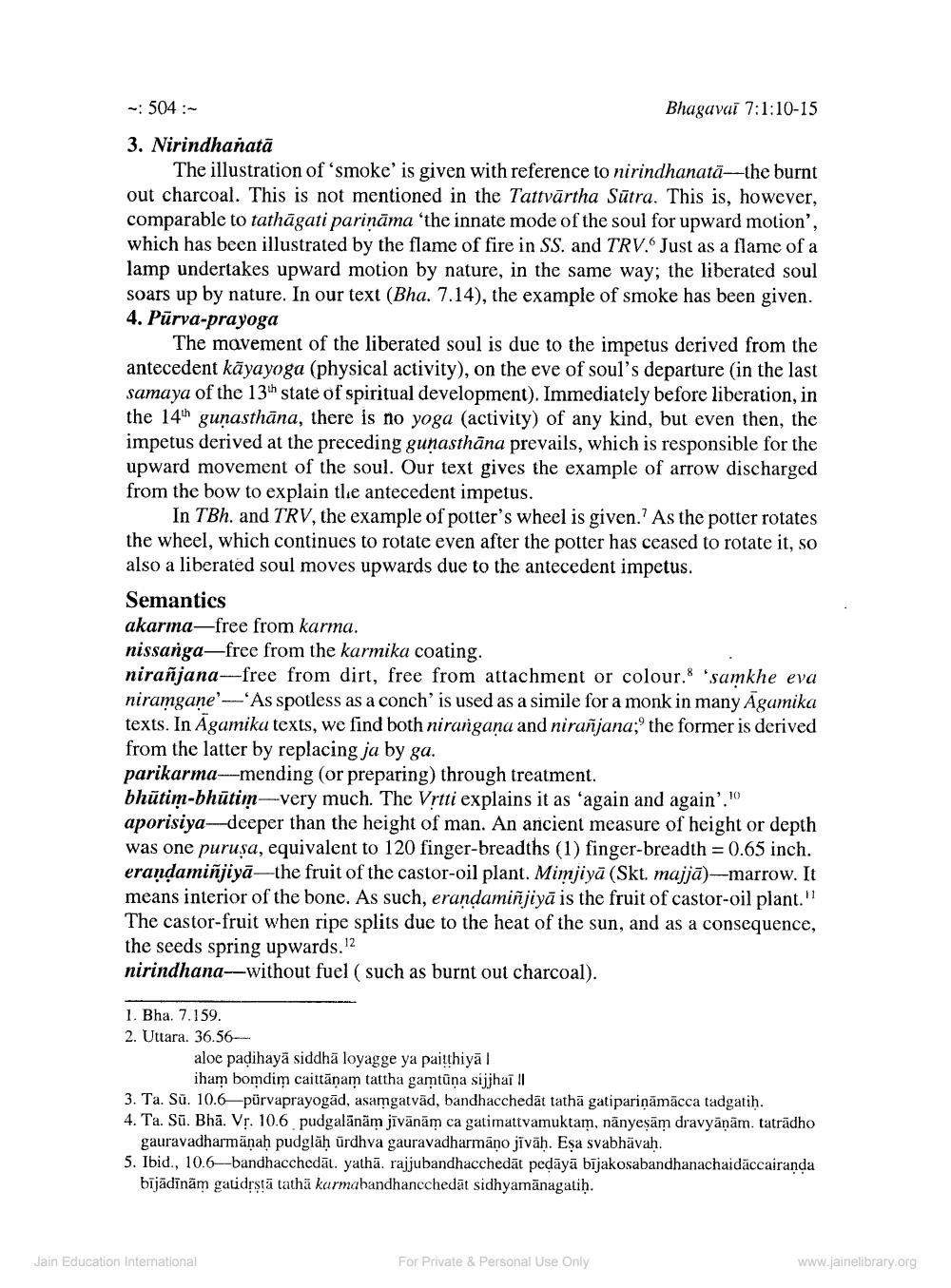________________
- 504:
Bhagavai 7:1:10-15
3. Nirindhanatā
The illustration of 'smoke' is given with reference to nirindhanatä---the burnt out charcoal. This is not mentioned in the Tattvārtha Sūtra. This is, however, comparable to tathāgati parināma 'the innate mode of the soul for upward motion', which has been illustrated by the flame of fire in SS. and TRV. Just as a flame of a lamp undertakes upward motion by nature, in the same way; the liberated soul soars up by nature. In our text (Bha. 7.14), the example of smoke has been given. 4. Pūrva-prayoga
The mavement of the liberated soul is due to the impetus derived from the antecedent kāyayoga (physical activity), on the eve of soul's departure (in the last samaya of the 13ih state of spiritual development). Immediately before liberation, in the 14th gunasthāna, there is no yoga (activity) of any kind, but even then, the impetus derived at the preceding gunasthāna prevails, which is responsible for the upward movement of the soul. Our text gives the example of arrow discharged from the bow to explain the antecedent impetus.
In TBh. and TRV, the example of potter's wheel is given.? As the potter rotates the wheel, which continues to rotate even after the potter has ceased to rotate it, so also a liberated soul moves upwards due to the antecedent impetus. Semantics akarma—free from karma. nissanga-free from the karmika coating. niranjana--free from dirt, free from attachment or colour.8 'samkhe eva niramgane'-'As spotless as a conch' is used as a simile for a monk in many Agamika texts. In Āgamiku texts, we find both nirangana and nirañjana;" the former is derived from the latter by replacing ja by ga. parikarma--mending (or preparing) through treatment. bhūtim-bhūtim-very much. The Vrtti explains it as again and again2.0 aporisiya—deeper than the height of man. An ancient measure of height or depth was one puruṣa, equivalent to 120 finger-breadths (1) finger-breadth = 0.65 inch. erandamiñjiyā—the fruit of the castor oil plant. Mimjiyä (Skt. majjā)---marrow. It means interior of the bone. As such, erandamiñjiyā is the fruit of castor-oil plant." The castor-fruit when ripe splits due to the heat of the sun, and as a consequence, the seeds spring upwards. 12 nirindhana--without fuel ( such as burnt out charcoal).
1. Bha. 7.159. 2. Uttara. 36.56
aloe padihaya siddhā loyagge ya paitthiyā.
iham bomdim caittānam tattha gamtüņa sijjhai Il 3. Ta. Sü. 10.
6 pürvaprayogād, asamgatvād, bandhacchedāt tathā gatipariņāmäcca tadgatih. 4. Ta. Sü. Bhā. Vp. 10.6 pudgalānām jīvānām ca gatimattvamuktam, nānyeşām dravyāņām. tatrādho
gauravadharmaṇaḥ pudglāh urdhva gauravadharmāņo jīvāh. Eșa svabhävah. 5. Ibid., 10.6—bandhacchedāt. yathā, rajjubandhacchedāt pedāyā bījakosabandhanachaidāccairanda
bijādinām gatidrstā tatha karmabandhancchedāt sidhyamanagatih.
Jain Education International
For Private & Personal Use Only
www.jainelibrary.org




